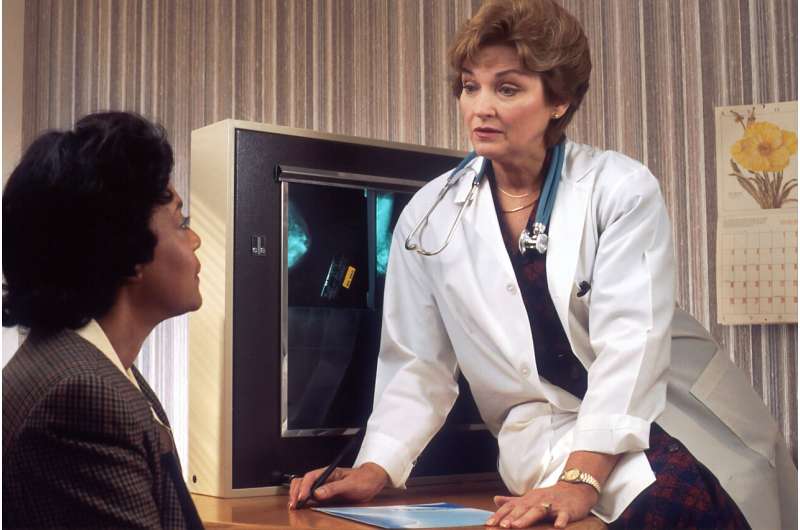
When a patient goes to their primary care clinic for a regular checkup, they expect to talk about preventing health problems and managing their health risks.
But a new study suggests that a large portion of adult patients, and their primary care providers, may stop short of discussing one source of potentially serious risk: firearms. The work is published in the Journal of General Internal Medicine.
More than half of adult patients (56%) skipped a question about firearms on the questionnaire used in many clinic waiting rooms and online portals at the health system where the study was conducted. But nearly all of them answered the rest of the questions about other health and social topics.
The patients received the questionnaires on paper or online as they checked in for health maintenance exams at the general internal medicine clinics of Michigan Medicine, the University of Michigan’s academic medical center.
Meanwhile, a survey of the providers at those clinics shows that 36% expressed comfort in discussing firearm-related risks with their patients. This survey included faculty physicians, resident physicians, nurse practitioners and physician assistants.
On the other hand, 32% felt it was only slightly important, or not important, to discuss firearm safety during checkups with all adult patients. However, 77% of the providers agreed it was important for them to discuss firearms and safety with their patients who have a history of mental health conditions, and 50% said the same about patients with substance use disorders.
Taken together, the study suggests a need for more research, and an opportunity for improvement in how primary care clinics train providers on firearm-related topics, and screen patients for potential firearm-related risks.
Several national organizations call for primary care providers to raise the question of firearm safety and risk with patients who might be at higher risk for suicide or harm to others. More than half of all firearm deaths in the United States are suicides, and firearms were used in just over half of suicides and 90% of those who use a firearm in a suicide die.
“Our hypothesis is that patients are deliberately not answering because they don’t want to—maybe because they feel uncomfortable talking about firearms with their doctor or other health provider,” says Joseph Ladines-Lim, M.D., Sc.D., lead author of the new study. Ladines-Lim is in his fourth year of residency in Michigan Medicine’s combined program for internal medicine and pediatrics.
“At the same time, our findings suggest there’s a lot of ambivalence from providers about asking their patients about firearms during the course of a routine visit,” he continued. “A decent number want to address it, but an almost equal number don’t think it’s something for them to address. However, there is a consensus about addressing it with those at higher risk, but we also found a lot of providers did not feel well-trained to discuss this issue.”
The survey was conducted in summer of 2022, and had 109 responses from providers at 10 clinics. Since that time more training has become available for Michigan Medicine health care providers about how to address firearm-related safety and risks with patients. For instance, it is now a formal part of the curriculum for Internal Medicine residents as they provide outpatient primary care.
For health providers anywhere, the U-M Institute for Firearm Injury Prevention offers a range of online learning on its site, including an online course specifically designed for clinicians that offers continuing education credit for members of multiple professions.
Ladines-Lim notes that the study revealed wide variation in how clinics in different locations incorporated a firearm-related screening question into their appointment process. It also showed that only 32% of clinicians even knew their clinic asked patients about firearms in their home. The study is based on a review of charts for 501 adult patients who had health maintenance exams in a one-month period.
He and colleagues have already carried out, and are preparing to publish, additional studies of firearm screening in other Michigan Medicine primary care clinics such as Family Medicine, Geriatrics and Pediatrics, and surveys of providers in other primary care clinics.
The Psychiatric Emergency Service in the Michigan Medicine Department of Psychiatry has implemented universal firearm screening and has begun offering education and counseling as well as free gun locks.
“Annual health maintenance visits in primary care include an ever-growing list of preventive health topics to discuss in a single appointment—without additional time provided as the list grows,” noted senior author Jennifer Meddings, M.D., M.Sc., an associate professor of internal medicine.
She added, “This list includes cancer screening and vaccine recommendations (tailored by patient age, sex and comorbidities as well as family history); depression screening; screening and reducing risk for diabetes, cardiovascular disease, substance use, sexually transmitted infections; and addressing an increasing list of topics for injury prevention such as fall risk, seatbelts, helmet use and sunscreen. Firearm screening is included routinely by some providers. However, most current physicians have received no training or guidelines for how best to screen, counsel and document firearm safety risk discussions.
“Studies have shown that many patients aren’t as resistant to discussing this topic as providers might suspect, especially in people with higher risks—but I suspect firearm use may be a sensitive topic such as obesity or substance abuse where asking permission of the patient to discuss it may be a helpful first step.”
In addition to Ladines-Lim and Meddings, the study’s authors are Kayla Secrest M.D., Autumn Pu M.D., Aaron Sifuentes M.D., Elizabeth Spranger B.A., and Jennifer Stojan M.D., MHPE, all of the Department of Internal Medicine. Ladines-Lim, Stojan and Meddings also have appointments in the Department of Pediatrics.
Meddings is a member of the U-M Institute for Healthcare Policy and Innovation, and the VA Center for Clinical Management Research.
More information:
Joseph Ladines-Lim et al, Firearm Screening and Counseling in General Medicine Primary Care Clinics at an Academic Medical Center, Journal of General Internal Medicine (2023). DOI: 10.1007/s11606-023-08379-x
Journal information:
Journal of General Internal Medicine
Source: Read Full Article


